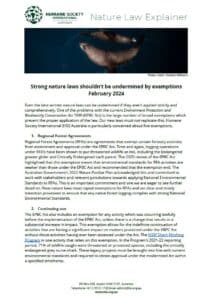You might remember Kalpana—I am happy to report that this year she celebrates her fifth rescue anniversary at Wildlife SOS. Formerly exploited and abused as a ‘begging’ elephant in Uttar Pradesh, Kalpana was rescued in 2019 and brought to the Wildlife SOS Elephant Hospital Campus (EHC) in Mathura for comprehensive...
Even the best written nature laws can be undermined if they aren’t applied strictly and comprehensively. One of the problems with the current Environment Protection and Biodiversity Conservation Act 1999 (EPBC Act) is the large number of broad exemptions which prevent the proper application of the law. Our new laws must not replicate this. Humane Society International (HSI) Australia is particularly concerned about five exemptions.
- Regional Forest Agreements
Regional Forest Agreements (RFAs) are agreements that exempt certain forestry activities from assessment and approval under the EPBC Act. Time and again, logging operations under RFA’s have been shown to put threatened wildlife at risk, including the Endangered greater glider and Critically Endangered swift parrot. The 2020 review of the EPBC Act highlighted that this exemption meant that environmental standards for RFA activities are weaker than those under the EPBC Act and recommended that the exemption end. The Australian Government’s 2022 Nature Positive Plan acknowledged this and committed to work with stakeholders and relevant jurisdictions towards applying National Environmental Standards to RFAs. This is an important commitment and one we are eager to see further detail on. New nature laws must repeal exemptions for RFAs and set clear and timely transition provisions to ensure that any native forest logging complies with strong National Environmental Standards.
- Continuing use
The EPBC Act also includes an exemption for any activity which was occurring lawfully before the implementation of the EPBC Act, unless there is a change that results in a substantial increase in impact. This exemption allows for the indefinite continuation of activities that are having a significant impact on matters protected under the EBPC Act without those activities having ever been assessed under the Act. The NSW Shark Meshing Program in one activity that relies on this exemption. In the Program’s 2021-22 reporting period, 71% of wildlife caught were threatened or protected species, including the critically endangered grey nurse shark. These legacy projects must be brought into line with current environmental standards and required to obtain approval under the modernised Act within a specified timeframe.
- National Interest
When introduced, the national interest exemption was intended to apply to genuine national emergencies where urgent action that may significantly impact protected matters was required in the national interest, for example for national defence and security emergencies. Unfortunately, this is not the way that this exemption has been used. Instead, it has been used to allow significant harm to wildlife, including flying-foxes in urban areas and through new shark culling programs, without any environmental assessment of those impacts. As previewed, the current reforms are proposing to tighten this exemption to ensure that it can only be used where it is reasonable and necessary to address an emergency or threat that affects the national interest and when the proposed action is time-critical and needs to be undertaken faster than the usual processes would allow. These are welcome limitations that must ensure that future national interest provisions cannot be misused in the way that the current exemption is.
- Ministerial call-in powers
Unfortunately, the strengthening of the current national interest exemption is being more than undermined by the proposed Ministerial ‘call-in’ powers. The call-in power would allow the Minister to choose to make an environmental approval decision that would otherwise be made by the independent Environment Protection Australia (EPA). If the Minister chooses to do so, it would switch off a number of decision-making safeguards and allow the Minister to approve projects that would otherwise be considered unacceptable, and to avoid the strict application of National Environmental Standards. These powers would undermine the independence of the EPA and call into question the integrity of the entire proposed new scheme. The proposed Ministerial call-in power should not be progressed.
- Offshore Petroleum Regulations
We are extremely concerned by the recent introduction of draft legislation that would potentially allow offshore petroleum activities to be subject to lesser consultation, assessment and decision-making requirements than would be required under the EPBC Act. Consultation, assessment and decision-making for offshore petroleum is already an ‘accredited’ process under the EPBC Act. That means that rather than the Minister for the Environment making decisions about offshore petroleum projects, the National Offshore Petroleum Safety and Environmental Management Authority (NOPSEMA) is accredited to do so. The accredited process places constraints on NOPSEMA designed to ensure that any decision-making is consistent with the requirements of the EPBC Act.
Under normal processes, if NOPSEMA wished to change their accredited process, they would need those changes to be reviewed under the EPBC Act. However, the Offshore Petroleum and Greenhouse Gas Storage Legislation Amendment (Safety and Other Measures) Bill 2024, removes this requirement, effectively exempting NOPSEMAs accredited process from the requirements of the EPBC Act. The introduction of this draft legislation does not provide confidence that any accredited arrangements under the EPBC Act could be relied on to provide the same standard of decision-making as the EPBC Act itself. This draft legislation could set a dangerous precedent and should not be approved.
Conclusion
To ensure adequate protection for wildlife and their habitats, new national environment laws should not contain the broad range of exemptions that exist under the current legislation, or worse. Any future exemptions should be tightly constrained and genuinely in the national interest.
Download a PDF version of this blog, so you can print and share with your Member of Parliament.

Learn more about what we need to achieve stronger laws for Australian nature. Read our other Nature Law Explainer blogs:
- What are National Environmental Standards and why do we need them?
- The importance of an “EPA”
- Critical habitat needs protection
- Managing wildlife trade
- Objects and Duties
- Strengthening Conservation Planning
- Climate change
- Community Rights in Decision Making
- Protecting Marine and Migratory Species
- Regional Planning
- What Triggers the EPBC act?
- What are biodiversity offsets? (Part 1)
- What are biodiversity offsets? (Part 2)
- What ‘triggers’ the EPBC Act?
- Environmental assessments and decision-making


